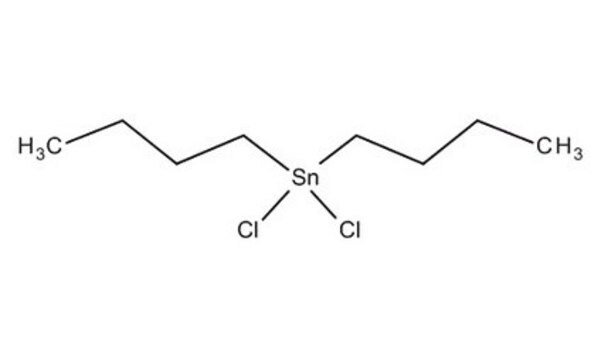229202
Diphenyltin dichloride
96%
Synonym(s):
Dichlorodiphenyltin
Sign Into View Organizational & Contract Pricing
All Photos(2)
About This Item
Linear Formula:
(C6H5)2SnCl2
CAS Number:
Molecular Weight:
343.82
EC Number:
MDL number:
UNSPSC Code:
12352103
PubChem Substance ID:
NACRES:
NA.22
Recommended Products
Quality Level
Assay
96%
form
solid
bp
333-337 °C (lit.)
mp
41-43 °C (lit.)
SMILES string
Cl[Sn](Cl)(c1ccccc1)c2ccccc2
InChI
1S/2C6H5.2ClH.Sn/c2*1-2-4-6-5-3-1;;;/h2*1-5H;2*1H;/q;;;;+2/p-2
InChI key
ISXUHJXWYNONDI-UHFFFAOYSA-L
Signal Word
Warning
Hazard Statements
Precautionary Statements
Hazard Classifications
Acute Tox. 4 Oral - Aquatic Acute 1 - Eye Irrit. 2 - Skin Irrit. 2 - STOT SE 3
Target Organs
Respiratory system
Storage Class Code
6.1C - Combustible acute toxic Cat.3 / toxic compounds or compounds which causing chronic effects
WGK
WGK 3
Flash Point(F)
235.4 °F - closed cup
Flash Point(C)
113 °C - closed cup
Personal Protective Equipment
dust mask type N95 (US), Eyeshields, Gloves
Choose from one of the most recent versions:
Already Own This Product?
Find documentation for the products that you have recently purchased in the Document Library.
M Ema et al.
Toxicology letters, 108(1), 17-25 (1999-09-03)
The objective of this study was to characterize the adverse effects of diphenyltin dichloride (DPTCl) during early pregnancy. Following successful mating, female rats were given DPTCl by gastric intubation at 0, 4.1, 8.3, 16.5, 24.8 or 33.0 mg/kg on days
Latifa Latrous et al.
Journal of mass spectrometry : JMS, 51(11), 1006-1015 (2016-11-04)
The gas-phase interactions of cysteine with di-organotin and tri-organotin compounds have been studied by mass spectrometry experiments and quantum calculations. Positive-ion electrospray spectra show that the interaction of di- and tri-organotins with cysteine results in the formation of [(R)
S Ohhira et al.
Journal of chromatography, 622(2), 173-178 (1993-12-22)
A method is described for the determination of inorganic tin by gas chromatography with flame photometric detection. The inorganic tins, stannous and stannic, were extracted with hydrochloric acid and n-hexane-benzene in the presence of 0.05% tropolone, and both inorganic tins
Ching-Chang Lee et al.
Chemosphere, 164, 568-575 (2016-09-16)
Organotin compounds have been applied as stabilizers for PVCs, fungicides, and pesticides, those can enter water systems through antifouling paints on ships as well as from diverse industrial and agricultural processes. This study aims to monitor the background levels of
J Gabrielska et al.
Zeitschrift fur Naturforschung. C, Journal of biosciences, 55(9-10), 758-763 (2000-12-01)
Phenyltins are chemicals widely used in industry, hence their occurrence in the human environment is frequent and widespread. Such compounds include hydrophobic phenyl rings bonded to positively charged tin. This molecular structure makes them capable of adsorbing onto and penetrating
Our team of scientists has experience in all areas of research including Life Science, Material Science, Chemical Synthesis, Chromatography, Analytical and many others.
Contact Technical Service










